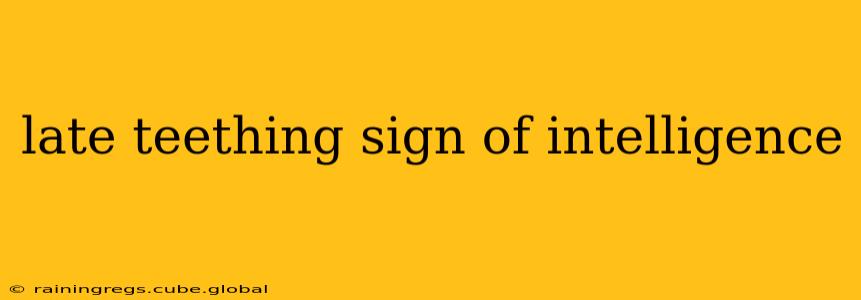The age at which a baby's teeth first emerge is a common topic of parental discussion, often accompanied by anxieties and comparisons. Many wonder if late teething signifies anything about a child's future development, particularly their intelligence. While anecdotal evidence and old wives' tales abound, the scientific consensus is clear: there's no conclusive evidence linking late teething to higher intelligence.
However, let's explore the reasons behind this misconception and delve into the factors that truly influence tooth eruption timing.
What is Considered Late Teething?
Before we address the intelligence question, it's crucial to define "late teething." The American Academy of Pediatric Dentistry (AAPD) generally considers the eruption of the first tooth after 12 months to be late. However, this is a broad guideline, and variations within the normal range are perfectly common. Genetic factors, nutrition, and overall health significantly influence the timing of tooth eruption. A child teething at 14 months isn't necessarily cause for concern unless accompanied by other developmental delays.
Does Late Teething Indicate Higher Intelligence? The Truth Behind the Myth
The myth associating late teething with higher intelligence likely stems from a correlation fallacy. Children develop at different paces. A child who is slow to teethe might also be a late walker or talker. This observation could lead some to incorrectly conclude that slower development in one area implies superior development in another. The reality is that these developmental milestones are largely independent of each other.
Several factors influence teething timing, and intelligence isn't one of them. These factors include:
- Genetics: Family history significantly impacts when a child's teeth appear. If parents or siblings experienced late teething, it's more likely their child will too.
- Nutrition: Proper nutrition, particularly sufficient calcium and vitamin D, is essential for healthy tooth development. Nutritional deficiencies can delay eruption.
- Overall Health: Premature babies, those with certain medical conditions, or children experiencing illness may exhibit delayed teething.
- Hormonal Factors: Hormonal imbalances can also influence the timing of tooth eruption.
What if My Child's Teething is Significantly Delayed?
While late teething itself isn't a cause for concern in most cases, significant delays (beyond 18 months) warrant a consultation with a pediatrician or pediatric dentist. They can assess the child's overall health and development and rule out any underlying medical conditions contributing to the delay. Early intervention is crucial if there are other developmental concerns.
What are the Signs of Developmental Delays to Watch Out For?
It's vital to distinguish between late teething as an isolated event and late teething accompanied by other developmental delays. These delays could include:
- Delayed motor skills: Difficulty sitting, crawling, or walking at the expected age.
- Delayed language development: Significant difficulty speaking or understanding language compared to peers.
- Social and emotional delays: Challenges interacting with others, expressing emotions appropriately, or engaging in social play.
When Should I Seek Professional Advice Regarding Teething?
Consult a healthcare professional if you notice:
- Significant delay in teething: The first tooth hasn't erupted by 18 months.
- Other developmental delays: Your child is significantly behind their peers in meeting developmental milestones.
- Pain or discomfort: Your child is experiencing significant pain associated with teething.
In Conclusion: Focus on Overall Development
Instead of focusing on the timing of teething as an indicator of intelligence, parents should concentrate on their child's overall health, nutrition, and developmental progress. Regular check-ups with a pediatrician and pediatric dentist are crucial for monitoring growth and addressing any concerns promptly. Remember, every child develops at their own pace, and variations within the normal range are expected. Late teething, in isolation, is not a reliable indicator of intelligence.
